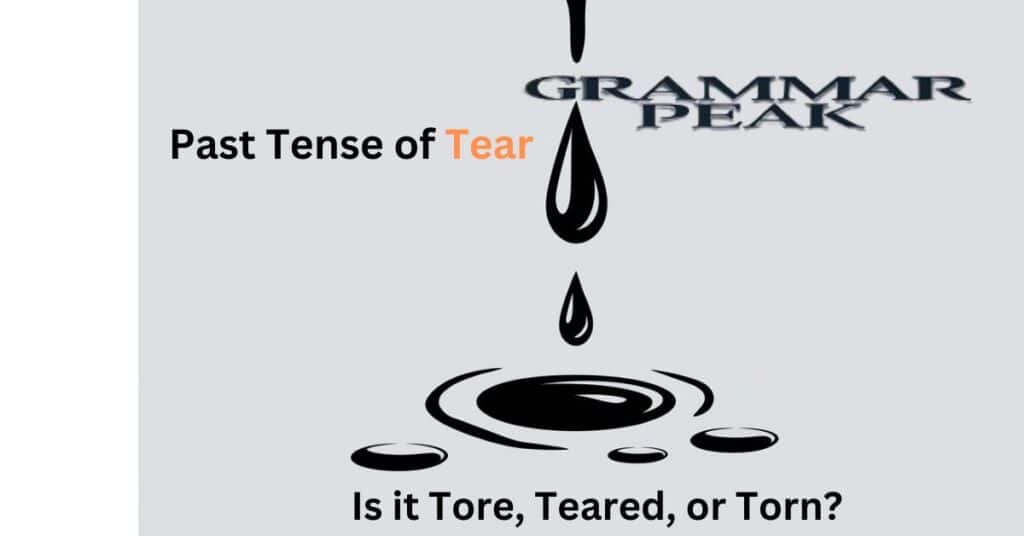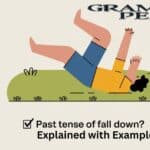In the English language, the past tense of the verb tear can be somewhat confusing due to its irregular conjugation. The verb refers to a variety of actions, from rending an object apart by force to shedding tears in response to emotion. The simple past tense of this verb is tore, used to express an action completed in the past.
However, when used in conjunction with a helping verb to form the past participle, the correct term is torn. The form teared is less common, but it’s used when referring to the act of shedding tears. These different forms underscore the complex nature of English verb conjugation.
Why is There Confusion?
The English language is fascinatingly complex, and the word “tear” is a prime example of this complexity. It’s a word that carries dual meanings, and each meaning has its own distinct past tense form. This dichotomy is the root of the confusion.
When we say “tear,” we could be talking about the act of ripping something apart, or the act of shedding tears. The past tense of “tear” when it means to rip something is “tore,” and the past participle is “torn.” However, when “tear” is used to denote crying or shedding tears, the past tense becomes “teared.”
Adding to the confusion is the homonymic nature of “tear.” Despite having the same spelling, “tear” (to rip) and “tear” (to cry) have different pronunciations. This multifaceted nature of the word “tear” often leaves language learners and even native speakers scratching their heads.
You will like What’s the Past Tense of Tear? Is it Tore, Teared, or Torn?
What Does the Word “Tear” Mean?
1. As a transitive verb
Here are eight sentences that use “tear” as a transitive verb, meaning the verb directly affects a noun or noun phrase:
- She decided to tear the letter into tiny pieces before throwing it away.
- The child managed to tear a page from his favorite picture book.
- Be careful not to tear your dress on that sharp nail.
- The dog managed to tear the toy apart in a matter of minutes.
- In his frustration, he began to tear his notes from the meeting.
- She always tears off the corner of her toast before she starts eating.
- During the argument, he tore the photo, causing irreversible damage.
- The wind was so strong that it tore the sign from its post.
2. As an intransitive verb
Here are eight sentences using “tear” as an intransitive verb, where the verb does not need to directly affect a noun:
- When he heard the news, he started to tear uncontrollably.
- The fabric will tear if you pull it too hard.
- The paper began to tear under the weight of the heavy object.
- I need to be careful with this old map, it can easily tear.
- The tissue started to tear when it got wet.
- If you twist the cap too tightly, the bottle will tear.
- My heart seems to tear every time I think about the incident.
- As I tried to lift the heavy bag, the bottom began to tear.
3. As a noun, specifically related to ripping or pulling
Here are eight sentences using “tear” as a noun, specifically related to ripping or pulling:
- There was a noticeable tear in her jeans after she accidentally caught them on a nail.
- The tear in the fabric made the dress look less appealing.
- He made a small tear in the paper while trying to open the envelope.
- The tear in the curtains allowed too much sunlight to enter the room.
- She winced when she saw the tear in her favorite shirt.
- The artist used a piece of canvas with a deliberate tear to create a unique effect.
- After the accident, there was a tear in the car’s upholstery.
- He noticed a tear in the cardboard box, which could cause the items inside to fall out.
4. As a noun, specifically related to crying
Here are eight sentences using “tear” as a noun, specifically related to crying:
- A single tear rolled down her cheek as she watched the emotional scene in the movie.
- He wiped away the tears from his face after hearing the sad news.
- The child’s tear glistened in the sunlight as he struggled to hold back his emotions.
- She felt a warm tear escape her eye during the heartfelt speech.
- With every tear that fell, she felt a bit of her sadness lift.
- He noticed the tears in her eyes and immediately knew something was wrong.
- A tear of joy formed in her eye when she received the unexpected gift.
- The sight of her old friend brought a tear to her eye, filled with nostalgia.
5. As an intransitive verb, specifically related to crying:
Here are eight sentences using “tear” as an intransitive verb, specifically related to crying:
- Her eyes began to tear up as she watched the emotional reunion.
- He tried not to tear up during the sad movie, but couldn’t help himself.
- She started to tear up when she heard the touching story.
- His eyes started to tear up as he chopped the onions.
- I couldn’t help but tear up when I saw the puppy in the shelter.
- She tried to hold back her emotions, but her eyes began to tear up.
- He didn’t usually tear up, but the news was too overwhelming.
- As she read the heartfelt letter, she began to tear up.
The Past Tense of “Tear”
Depending on its usage, the past tense of “tear” changes. When used to mean “rip apart,” the past tense is “tore,”
1. “Tore,”
Here are five sentences using “tore,” the past tense of “tear”:
- He tore open the envelope, eager to read the letter inside.
- She tore her dress on the sharp edge of the table.
- The dog tore through the trash, scattering it all over the floor.
- The child tore the wrapping paper off the gift with excitement.
- The wind tore the leaves from the trees during the storm.
2. “Torn,”
Here are five sentences using “torn,” the past participle of “tear”:
- The old book was torn and tattered from years of use.
- She was torn between two choices, unable to decide which path to take.
- The poster had been torn down during the protest.
- His jeans were torn at the knees, giving them a rugged look.
- The letter was torn into pieces after the argument.
3. “Teared,”
Here are five sentences using “teared,” the past tense of “tear” in the context of crying:
- She teared up when she heard the touching story.
- He teared up during the emotional movie scene.
- I teared up when I saw the puppy in the shelter.
- Her eyes teared up as she said goodbye to her best friend.
- He teared up as he read the heartfelt letter from his family.
You might Be What’s the Past Tense of Tear? Is it Tore, Teared, or Torn?
Pronunciation of “Tear,” “Tore,” “Torn,” and “Teared”
Pronunciation plays a crucial role in differentiating these words.
“Tear” (to rip) rhymes with
“bear,” while “tear” (to cry)
Rhymes with “fear.”
A Simple Table Showing the Present, Past, and Future Tense of the Verb “Tear”
Here’s a simple table illustrating the different tenses of the verb tear in its two distinct meanings:
| Tense | Tear (To Rip) | Tear (To Weep) |
| Present | Tear | Tear |
| Past | Tore | Teared |
| Future | Will Tear | Will Tear |
In the table, the verb tear in the present tense remains the same for both meanings. In the past tense, when referring to ripping something, it changes to tore, while in the context of weeping, it becomes teared. In the future tense, irrespective of whether it’s used to indicate ripping or weeping, the form will tear is utilized.
Examples of “Tear,” “Tore,” “Torn,” and “Teared” in Sentences
To fully grasp their usage, let’s look at examples:
1. Tear (The Present Tense):
Here are ten sentences using “tear” in the present tense:
- Don’t tear the paper; we need it for the project.
- I always tear up when I watch that movie.
- Be careful not to tear your dress on the sharp edge of the table.
- The dog loves to tear up the newspaper every morning.
- If you tear the lettuce by hand, it stays fresher longer.
- She tends to tear up during emotional speeches.
- The kids love to tear open their presents on Christmas morning.
- He tends to tear up when chopping onions.
- Don’t tear the wrapping paper; we can reuse it.
- She will tear up if she sees that sad commercial again.
2. Tore (The Simple Past Tense):
Here are ten sentences using “tore,” the simple past tense of “tear”:
- She tore the paper in half to share the information with her colleague.
- The dog tore through the trash, leaving a mess in the kitchen.
- He tore open the envelope, eager to read the news.
- The wind tore the leaves from the trees during the storm.
- She tore her dress on a nail sticking out from the wall.
- The child tore the wrapping paper off the gift in excitement.
- He tore up the letter after reading it, not wanting anyone else to see.
- The car tore down the street, leaving a cloud of dust behind.
- She tore the recipe out of the magazine to keep for later.
- The team tore through their competition, winning the championship.
3. Torn (The Past Participle):
Here are ten sentences using “torn,” the past participle of “tear”:
- The paper has been torn; we can’t use it anymore.
- His jeans were torn at the knees from years of wear.
- The poster had been torn down during the protest.
- The old map was torn and faded, but still usable.
- She was torn between two choices, unable to decide which path to take.
- The letter was torn into pieces after the argument.
- The fabric was torn during the move, so we’ll need to replace it.
- The book’s cover was torn, but the pages were still intact.
- The flag had been torn in the high winds.
- The photograph was torn during the fight, causing a rift between the friends.
4. Teared (The Past Tense of Tear for Crying or Shedding Tears):
Here are ten sentences using “teared,” the past tense of “tear” in the context of crying:
- She teared up during the heartfelt speech at the wedding.
- He teared at the sight of his childhood home being demolished.
- The movie was so touching that it teared many audience members.
- When she received the news, she teared and couldn’t speak for a moment.
- He teared as he watched the emotional reunion on television.
- The documentary was so powerful that it teared him up by the end.
- She teared when she saw the photos of her late grandmother.
- The song was so beautiful that it teared him up every time he heard it.
- During the farewell party, she teared as her friends shared memories.
- He teared while reading the letter from his best friend who had moved away.
Synonyms for “Tear,” “Tore,” “Torn,” and “Teared”
Knowing synonyms can enrich our vocabulary. Here are some alternatives:
1. Tear (Present Tense): Rip, rend, split
Here are two sentences using “tear” in the present tense, with the meanings of rip, rend, and split:
- Be careful not to tear the delicate fabric while you’re sewing; it’s easy to accidentally rend it.
- If you tear the bread into pieces instead of cutting it, you’ll get a more rustic look for your sandwich.
2. Tore (Simple Past Tense): Ripped, rent, split
Here are two sentences using “tore” in the simple past tense, incorporating the meanings of ripped, rent, and split:
- He tore the fabric so badly that it was completely ripped apart at the seams.
- During the storm, the wind tore the old tree in half, leaving it split down the middle.
3. Torn (Past Participle): Ripped, rent, split
Here are two sentences using “torn” in the past participle form, incorporating the meanings of ripped, rent, and split:
- The fabric has been torn so many times that it looks like it has been ripped beyond repair.
- The contract was torn in half, leaving the agreement rent and invalid.
4. Teared (Past Tense for Crying): Wept, cried, sobbed
Here are two sentences using “teared” in the past tense for crying, incorporating the meanings of wept, cried, and sobbed:
- She teared up during the emotional scene in the movie, unable to hold back her sobs.
- After hearing the sad news, he teared up and wept quietly in the corner.
Origins of the Word “Tear”
The origins of “tear” trace back to Old English “tear,” meaning a drop of fluid secreted by the eye, and “teran,” meaning to pull apart.
The word “tear” is versatile, serving as both a noun and a verb with different meanings:
1. The Noun “Tear” (The Fluid Drop from the Eye)
A tear is a drop of fluid secreted by the lacrimal glands located in the upper outer quadrant of our eyes. This fluid serves to moisten the cornea and conjunctiva, providing them with necessary nutrients and oxygen.
Moreover, tears play a significant role in maintaining eye health by washing away debris and protecting the eye from bacterial infection. Interestingly, not all tears are the same. There are three types: basal tears, reflex tears, and emotional tears. Basal tears are the tears that are always present in our eyes, providing constant lubrication.
2. The Verb “Tear” (To Rend or Pull Apart by Force)
To tear something is to rend or pull it apart by force, often resulting in two or more pieces from what was initially a single entity. This action can be intentional, as when someone tears a piece of paper into smaller parts, or it can be accidental, as when a person tears their clothing on a sharp object.
The verb “tear” carries connotations of abruptness and violence, as the action often involves a quick, forceful motion and typically leaves the torn object irreparably damaged. In a more metaphorical sense, the verb tear can also describe non-physical actions and experiences
3. The Verb “Tear” (To Weep or Cry)
The verb tear in the context of expressing emotion, specifically crying, is less common but nonetheless poignant. It is often used in a phrase such as “tear up,” indicating the beginning of crying or the welling up of tears in a person’s eyes. This can occur in response to a wide range of emotions, including sadness, happiness, frustration, or even relief.
The act of tearing up is usually involuntary, triggered by an emotional response to an event or situation. In literary works, the verb tear used to depict crying can add a layer of depth and intensity to the narrative. It suggests an emotional response so strong that it prompts a physical manifestation – tears.
4. The Noun “Tear” (A Tearing or Laceration)
The noun tear, when used to denote a tearing or laceration, typically refers to a breach or rupture in the surface of a material or tissue. This term is often used in medical contexts, where it might describe a muscle tear or a torn ligament.
Such injuries can occur due to excessive strain or sudden forceful movements, and they often require immediate medical attention and prolonged rest to heal properly. In a broader sense, the noun tear can also refer to similar damage in non-biological materials. For instance, a tear in a piece of fabric or a tear in a page of a book.
5. The Verb “Tear” (To Move Noisily)
The verb tear can also be used to describe a fast, often noisy, and uncontrolled movement, typically in a linear direction. This usage is commonly found in contexts involving vehicles or people moving at high speed. For instance, a car might tear down the road, suggesting not only a high speed but also a certain recklessness or urgency.
Similarly, a person might tear through a crowd, indicating a swift and possibly disruptive passage through a group of people.In literature and storytelling, the verb tear employed in this sense can create a vivid, dynamic scene. It suggests a sense of urgency or desperation that propels the subject forward without regard for obstacles or potential consequences.
FAQ” S
What is the past participle of “tear”?
The past participle of “tear” (to rip) is “torn.” For “tear” (to cry), it’s “teared.”
What is the difference between “tore” and “teared”?
“Tore” is the past tense of “tear” when it means to rip apart, while “teared” is the past tense when “tear” means to cry.
Are there different pronunciations for “tear”?
Yes, “tear” (to rip) rhymes with “bear,” and “tear” (to cry) rhymes with “fear.”
What are some synonyms for “tore” and “teared”?
Synonyms for “tore” include ripped, rent, split. For “teared,” synonyms include wept, cried, sobbed.
What is the origin of the word “tear”?
The word “tear” comes from Old English “tear” (a drop secreted from the eye) and “teran” (to rip apart).
Conclusion
The verb tear encompasses a variety of meanings, each rich with emotion and imagery. Whether it refers to weeping, moving noisily, or causing a laceration, the term captures powerful actions and experiences. The physical and emotional implications of tearing highlight the complexity of human expression and interaction. Understanding these nuances enhances our appreciation for language and its ability to convey deep feelings and vivid scenarios. Ultimately, tear serves as a reminder of the multifaceted nature of our responses to life’s challenges and triumphs.

Mason Blake is an experienced blogger with a passion for language and communication. With years of expertise in crafting informative and engaging content, Mason shares valuable insights on grammar and writing. His clear, concise, and reader-friendly approach has earned him a loyal following, helping readers sharpen their language skills and master the art of effective communication.








Thanks for sharing. I read many of your blog posts, cool, your blog is very good.
Thank you for your sharing. I am worried that I lack creative ideas. It is your article that makes me full of hope. Thank you. But, I have a question, can you help me?
Thank you for your sharing. I am worried that I lack creative ideas. It is your article that makes me full of hope. Thank you. But, I have a question, can you help me?
Thank you, your article surprised me, there is such an excellent point of view. Thank you for sharing, I learned a lot.
I don’t think the title of your article matches the content lol. Just kidding, mainly because I had some doubts after reading the article.
Thank you, your article surprised me, there is such an excellent point of view. Thank you for sharing, I learned a lot.
I don’t think the title of your article matches the content lol. Just kidding, mainly because I had some doubts after reading the article.
Thank you for your sharing. I am worried that I lack creative ideas. It is your article that makes me full of hope. Thank you. But, I have a question, can you help me? https://www.binance.com/join?ref=IJFGOAID
Can you be more specific about the content of your article? After reading it, I still have some doubts. Hope you can help me.